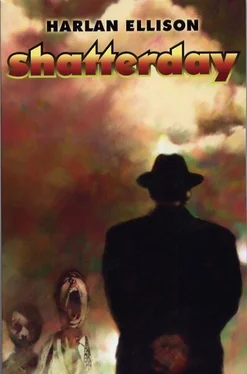He had run out of breath. He stopped, and Ian plunged into the gap. “That’s what I’d like to know, Mr. Cowper: what’s happened to me? I’ve lost everything, but I can remember everything, too. I know I should be going crazy or frightened, and I am scared, but not out of my mind with it… I seem to accept this, whatever it is. I—I don’t know how to take it, but I know I’m not feeling it yet. And I’ve been here a long time!”
The old man slipped his arm around Ian’s back and began walking with him, two gentlemen strolling in confidence on a summer afternoon by the edge of a cool park. “Quite correct, sir, quite correct. Dissociative behavior; mark of the man unable to accept his destiny. Accept it, sir, I urge you; and fascination follows. Perhaps even obsession, but we must run that risk, mustn’t we?”
Ian wrenched away from him, turned to face him. “Look, mister, I don’t want to hear all that craziness! I want to know where I am and how I get out of here. And if you can’t tell me, then leave me alone!”
“Nothing easier, my good man. Explanation is the least of it. Observation of phenomena, ah, that’s the key. You can follow? Well, then: we are victims of the law of conservation of time. Precisely and exactly linked to the law of the conservation of matter; matter, which can neither be created nor destroyed. Time exists without end. But there is an ineluctable entropic balance, absolutely necessary to maintain order in the universe. Keeps events discrete, you see. As matter approaches universal distribution, there is a counterbalancing, how shall I put it, a counterbalancing ‘leaching out’ of time. Unused time is not wasted in places where nothing happens. It goes somewhere. It goes here, to be precise. In measurable units {which I’ve decided, after considerable thought, to call ‘chronons’).”
He paused, perhaps hoping Ian would compliment him on his choice of nomenclature. Ian put a hand to his forehead; his brain was swimming. “That’s insane. It doesn’t make sense.”
“Makes perfectly good sense, I assure you. I was a top savant in my time; what I’ve told you is the only theory that fits the facts. Time unused is not wasted; it is leached out, drained through the normal space-time continuum and recycled. All this history you see shooting past us is that part of the timeflow that was wasted. Entropic balance, I assure you.”
“But what am I doing here?”
“You force me to hurt your feelings, sir.”
“ What am I doing here?!”
“You wasted your life. Wasted time. All around you, throughout your life, unused chronons were being leached out, drawn away from the contiguous universe, until their pull on you was irresistible. Then you went on through, pulled loose like a piece of wood in a rushing torrent, a bit of chaff whirled away on the wind. Like Fabrizio, you were never really there. You wandered through, never seeing, never participating, and so there was nothing to moor you solidly in your own time.”
“But how long will I stay here?”
The old man looked sad and spoke kindly for the first time: “Forever. You never used your time, so you have nothing to rely on as anchorage in normal space.”
“But everyone here thinks there’s a way out. I know it! They keep walking, trying to find an exit.”
“Fools. There is no way back.”
“But you don’t seem to be the sort of person who wasted his life. Some of the others I’ve seen, yes, I can see that; but you?”
The old man’s eyes grew misty. He spoke with difficulty. “Yes, I belong here…”
Then he turned and, like one in a dream, lost, wandered away. Lunatic, observing phenomena. And then gone in the grayness of time-gorged limbo. Part of a glacial period slid past Ian Ross and he resumed his walk without destination.
And after a long, long time that was timeless but filled with an abundance of time, he met Catherine.
He saw her as a spot of darkness against the gray limbo. She was quite a distance away, and he walked on for a while, watching the dark blotch against gray, and then decided to change direction. It didn’t matter. Nothing mattered; he was alone with his memories, replaying again and again.
The sinking of the Titanic wafted through him.
She did not move, even though he was approaching on a direct line.
When he was quite close he could see that she was sitting cross-legged on nothingness; she was asleep. Her head was propped in one hand, the bracing arm supported by her knee. Asleep.
He came right up to her and stood there simply watching. He smiled. She was like a bird, he thought, with her head tucked under her wing. Not really, but that was how he saw her. Though her cupped hand covered half her face he could make out a sweet face, very pale skin, a mole on her throat; her hair was brown, cut quite short. Her eyes were closed: he decided they would be blue.
The Greek senate, the age of Pericles, men in a crowd—property owners—screaming at Lycurgus’ exhortations in behalf of socialism. The shadow of it sailed past not very far away.
Ian stood staring, and after a while he sat down opposite her. He leaned back on his arms and watched. He hummed an old tune the name of which he did not know.
Finally, she opened her brown eyes and stared at him.
At first momentary terror, shock, chagrin, curiosity. Then she took umbrage. “How long have you been there?”
“My name is Ian Ross,” he said.
“I don’t care what your name is!” she said angrily. “I asked you how long you’ve been sitting there watching me?”
“I don’t know. A while.”
“I don’t like being watched; you’re being very rude.”
He got to his feet without answering, and began walking away. Oh well.
She ran after him. “Hey, wait!”
He kept walking. He didn’t have to be bothered like that. She caught up with him and ran around to stand in front of him. “I suppose you just think you can walk off like that!”
“Yes, I can. I’m sorry I bothered you. Please get out of my way if you don’t want me around.”
“I didn’t say that.”
“You said I was being rude. I am never rude; I’m a very well-mannered person and you were just being insulting.”
He walked around her. She ran after him.
“All right, okay, maybe I was a little out of sorts. I was asleep, after all.”
He stopped. She stood in front of him. Now it was her move. “My name is Catherine Molnar. How do you do?”
“Not too well, that’s how.”
“Have you been here long?”
“Longer than I wanted to be here, that’s for sure.”
“Can you explain what’s happened to me?”
He thought about it. Walking with someone would be a nice change. “Let me ask you something,” Ian Ross said, beginning to stroll off toward the phantom image of the hanging gardens of Babylon wafting past them, “did you waste a lot of time, sitting around, not doing much, maybe watching television a lot?”
They were lying down side-by-side because they were tired. Nothing more than that. The Battle of the Ardennes, First World war, was all around them. Not a sound. Just movement. Mist, fog; turretless tanks, shattered trees all around them. Some corpses left lying in the middle of no man’s land. They had been together for a space of time… it was three hours, it was six weeks, it was a month of Sundays, it was a year to remember, it was the best of times, it was the worst of times: who could measure it, there were no signposts, no town criers, no grandfather clocks, no change of seasons, who could measure it?
They had begun to talk freely. He told her again that his name was Ian Ross and she said Catherine, Catherine Molnar again. She confirmed his guess that her life had been empty. “Plain,” she said. “I was plain. I am plain. No, don’t bother to say you think I have nice cheekbones or a trim figure; it won’t change a thing. If you want plain, I’ve got it.”
Читать дальше












